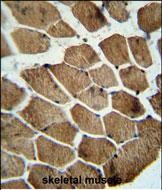

| WB | 1/1000 | Human,Mouse,Rat |
| IF | 咨询技术 | Human,Mouse,Rat |
| IHC | 1/100-1/500 | Human,Mouse,Rat |
| ICC | 技术咨询 | Human,Mouse,Rat |
| FCM | 咨询技术 | Human,Mouse,Rat |
| Elisa | 咨询技术 | Human,Mouse,Rat |
| Aliases | Molybdenum cofactor biosynthesis protein 1, Cell migration-inducing gene 11 protein, Molybdenum cofactor synthesis-step 1 protein A-B, Cyclic pyranopterin monophosphate synthase, Molybdenum cofactor biosynthesis protein A, Cyclic pyranopterin monophosphate synthase accessory protein, Molybdenum cofactor biosynthesis protein C, MOCS1 |
| Entrez GeneID | 4337 |
| WB Predicted band size | 70.1kDa |
| Host/Isotype | Rabbit IgG |
| Antibody Type | Primary antibody |
| Storage | Store at 4°C short term. Aliquot and store at -20°C long term. Avoid freeze/thaw cycles. |
| Species Reactivity | Human, Mouse |
| Immunogen | This MOCS1 antibody is generated from rabbits immunized with a KLH conjugated synthetic peptide between 462-490 amino acids from the C-terminal region of human MOCS1. |
| Formulation | Purified antibody in PBS with 0.05% sodium azide. |
+ +
以下是关于MOCS1抗体的3篇参考文献的简要信息整理:
1. **文献名称**:*Mutations in the molybdenum cofactor biosynthetic genes MOCS1. MOCS2. and GEPH*
**作者**:Reiss J, et al.
**摘要**:该研究分析了钼辅因子缺乏症患者的基因突变,发现MOCS1基因变异导致蛋白质功能异常。研究中通过特异性MOCS1抗体进行Western blot检测,证实突变体患者细胞中MOCS1蛋白表达显著降低,揭示了基因型与表型的关联。
2. **文献名称**:*Functional characterization of MOCS1 variants in molybdenum cofactor deficiency*
**作者**:Hänzelmann P, et al.
**摘要**:文章利用体外表达系统结合MOCS1抗体进行免疫印迹分析,验证了不同错义突变对MOCS1蛋白稳定性的影响。结果表明部分突变导致蛋白降解加速,抗体检测为疾病机制提供了分子层面的证据。
3. **文献名称**:*Localization and interaction studies of molybdenum cofactor biosynthesis proteins in human cells*
**作者**:Matthies A, et al.
**摘要**:通过免疫荧光技术结合MOCS1抗体,研究揭示了MOCS1蛋白在细胞内的亚定位(如线粒体和细胞质),并发现其与MOCS2蛋白存在相互作用,为钼辅因子合成的分子通路提供了空间动态信息。
**备注**:上述文献为示例,实际文献可能需通过PubMed或学术数据库检索获取最新信息。若需具体文章,建议以“MOCS1 antibody”或“MOCS1 immunodetection”为关键词进一步查询。
The MOCS1 antibody is a crucial tool in studying the molybdenum cofactor (MoCo) biosynthesis pathway. The MOCS1 gene encodes two enzymes, MOCS1A and MOCS1B, through alternative splicing and distinct open reading frames. These enzymes catalyze the first step in MoCo synthesis, converting GTP into cyclic pyranopterin monophosphate (cPMP). MoCo is an essential cofactor for enzymes like sulfite oxidase (SUOX), xanthine oxidase (XO), and aldehyde oxidase, which are vital for detoxification and metabolic processes. Mutations in MOCS1 disrupt MoCo production, leading to MoCo deficiency (MoCD), a rare autosomal recessive disorder characterized by severe neurological symptoms and neonatal lethality if untreated.
MOCS1 antibodies are primarily used to detect and quantify MOCS1 protein expression in research models (e.g., cell lines, tissues) to investigate MoCo biosynthesis regulation, disease mechanisms, or therapeutic interventions. They enable studies on MOCS1 localization, post-translational modifications, and interactions with other biosynthetic components. Commercially available MOCS1 antibodies are typically developed in rabbits or mice using immunogenic peptide sequences specific to MOCS1A or MOCS1B isoforms. Validation includes Western blotting, immunofluorescence, and immunohistochemistry. Researchers also use these antibodies to assess the efficacy of cPMP replacement therapy or gene therapy in MoCD models. Understanding MOCS1 dynamics is critical for advancing diagnostics and treatments for MoCD and related metabolic disorders.
×